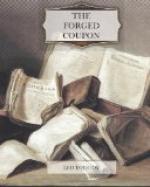Yet Tolstoy found true idealism in the toiling peasant who believed in God, rather than in his intellectual superior who believed in himself in the first place, and gave a conventional assent to the existence of a deity in the second. For the peasant was still religious at heart with a naive unquestioning faith—more characteristic of the fourteenth or fifteenth century than of to-day—and still fervently aspired to God although sunk in superstition and held down by the despotism of the Greek Church. It was the cumbrous ritual and dogma of the orthodox state religion which roused Tolstoy to impassioned protests, and led him step by step to separate the core of Christianity from its sacerdotal shell, thus bringing upon himself the ban of excommunication.
The signal mark of the reprobation of “Holy Synod” was slow in coming—it did not, in fact, become absolute until a couple of years after the publication of “Resurrection,” in 1901, in spite of the attitude of fierce hostility to Church and State which Tolstoy had maintained for so long. This hostility, of which the seeds were primarily sown by the closing of his school and inquisition of his private papers in the summer of 1862, soon grew to proportions far greater than those arising from a personal wrong. The dumb and submissive moujik found in Tolstoy a living voice to express his sufferings.
Tolstoy was well fitted by nature and circumstances to be the peasant’s spokesman. He had been brought into intimate contact with him in the varying conditions of peace and war, and he knew him at his worst and best. The old home of the family, Yasnaya Polyana, where Tolstoy, his brothers and sister, spent their early years in charge of two guardian aunts, was not only a halting-place for pilgrims journeying to and from the great monastic shrines, but gave shelter to a number of persons of enfeebled minds belonging to the peasant class, with whom the devout and kindly Aunt Alexandra spent many hours daily in religious conversation and prayer.
In “Childhood” Tolstoy apostrophises with feeling one of those “innocents,” a man named Grisha, “whose faith was so strong that you felt the nearness of God, your love so ardent that the words flowed from your lips uncontrolled by your reason. And how did you celebrate his Majesty when, words failing you, you prostrated yourself on the ground, bathed in tears” This picture of humble religious faith was amongst Tolstoy’s earliest memories, and it returned to comfort him and uplift his soul when it was tossed and engulfed by seas of doubt. But the affection he felt in boyhood towards the moujiks became tinged with contempt when his attempts to improve their condition—some of which are described in “Anna Karenina” and in the “Landlord’s Morning”—ended in failure, owing to the ignorance and obstinacy of the people. It was not till he passed through the ordeal of war in Turkey and the Crimea that he discovered in the common soldier who fought by his side an unconscious heroism, an unquestioning faith in God, a kindliness and simplicity of heart rarely possessed by his commanding officer.




